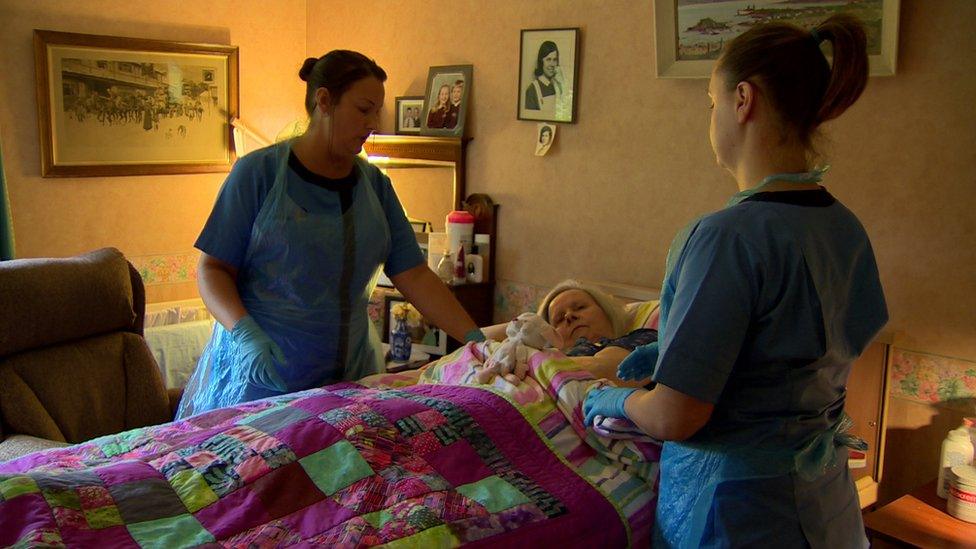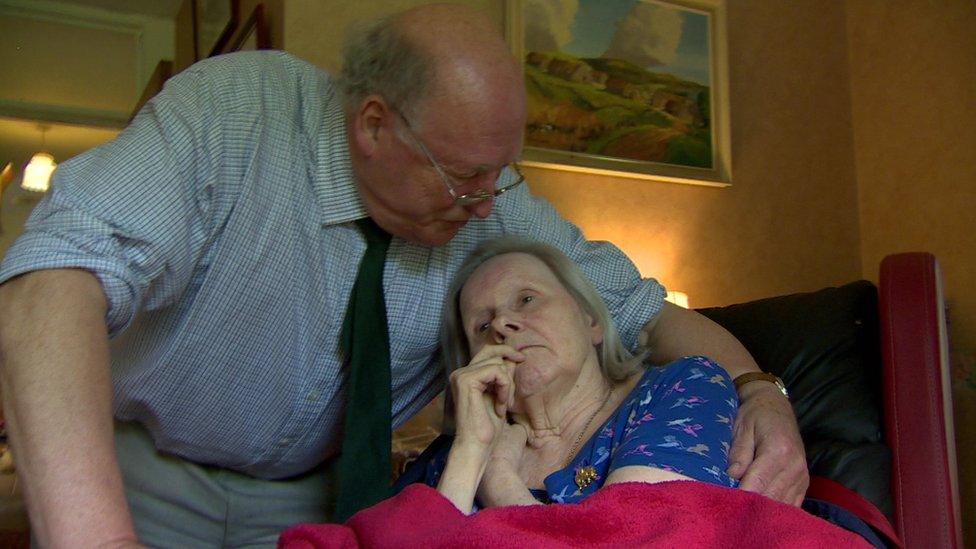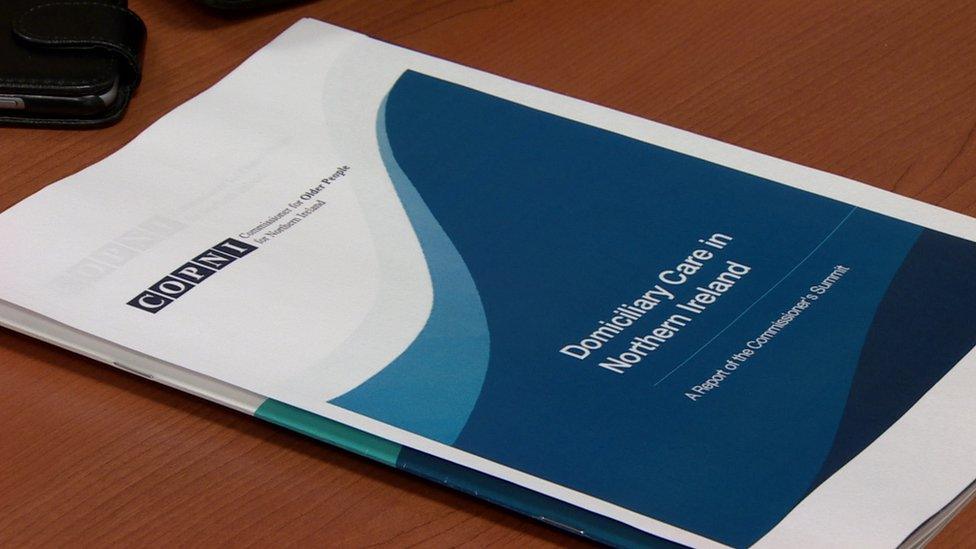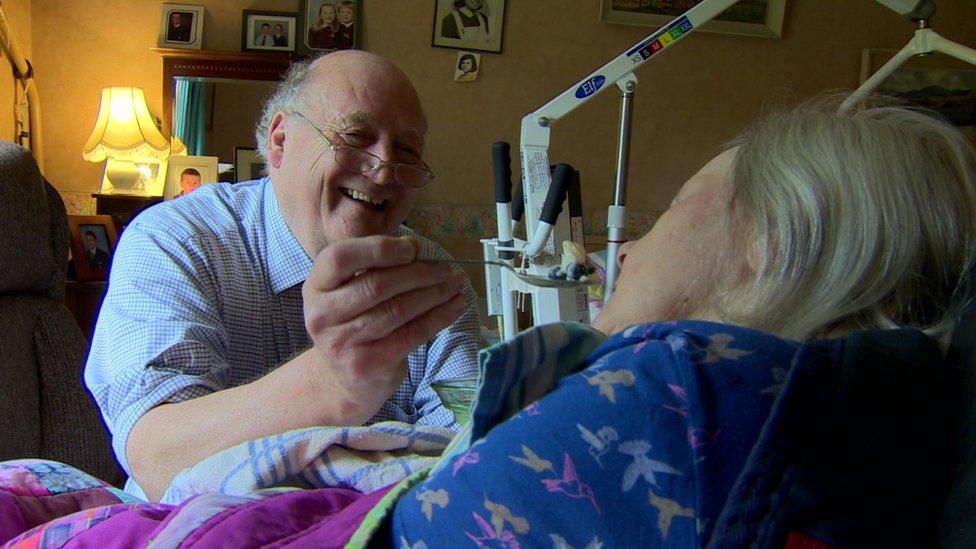Elderly home care services in NI 'at breaking point'
- Published

Home visits lasting 15 minutes or less are too short to provide dignified personal care, the report says
Home care services across Northern Ireland's five health trusts are at breaking point, the outgoing commissioner for older people has said.
Claire Keatinge told the BBC that care being provided is failing to meet older people's needs due to underinvestment.
Her office has carried out a wide-ranging report on home care services.
It asks why many people have to be assessed as "critical" before receiving any care, and also queries the pay and training of domiciliary staff.
The report, entitled Domiciliary Care in Northern Ireland, calls on the government to match need with resources.
Ms Keatinge said older people deserve better.
Scrutiny
"You cannot provide personal care in the amount of time - often 15 minutes - that is often being awarded to older people," she said.
"Older people don't want to be put to bed at 5.15pm having had their afternoon meal at 3.15pm."

There are concerns that home care services will be stretched as the population ages
It is the first time Northern Ireland's domiciliary care services, including the commissioning, regulation, inspection and delivery of care, have been held to scrutiny.
Demands on the service will continue to grow, according to the commissioner.
Claire Keatinge says older people deserve better domiciliary care than many are currently receiving
"Since our summit in September, I have spoken to lots of different people in the sector and those getting care at home.
"I was shocked to hear of care workers being expected to provide incontinence management when they aren't trained or experienced to deal with that level of care - it really is shocking."
'Numbers on a spreadsheet'
One worker, who spoke to BBC Radio Ulster's Evening Extra programme, said the care has gone out of caring as people are reduced to "numbers on a spreadsheet".
The man, who chose to remain anonymous, said the care industry has worsened since he began working in it almost 14 years ago.
"Whenever I first started, we would have a personal care-call in the morning and we would have an hour for that, to get someone up out of bed, washed, dressed, get them their breakfast, things like that.
"Now, it's 15 minutes to get somebody out of bed, dressed, ready for the day. Fifteen minutes and you're out the door."
He said the timeframe within which care workers are expected to operate wasn't feasible.
19 different carers in one week
"You constantly run over your time. You can't really talk to the client because you're rushing about trying to get it done and on to the next one."
He explained that when he first started, he had time to build up a relationship with his elderly clients because he was assigned to each one for sustained period of time.
"Now our clients could have different carers every single day. I know of one case where the person had 19 different care-workers in a week."
The man believes that those he cares for appreciate the work he and his colleagues do, and he says they understand the pressure they are under.
"They know it's coming from the top down. Morale in the health service is rock bottom at the minute. We have that many people to report to, everybody is under strain."
He suggested that if care-workers were given more control of the rotas and the assignments, the work would be done more efficiently.
"We cannot get from a call on, say, the Cregagh Road, to the top of Carryduff in rush hour traffic in ten minutes. It's just not possible.
"They should let us work in the same areas, with the same people. That way, all the calls will get done and the clients will be happy.
"It's just simple little things, but it's not thought of."
He blamed budgets cuts for the ongoing problems.
"It's just a case of doing the job as fast as you can and getting out.
"Nobody is happy but we do this job because we love it - if I didn't I'd have left years ago."

Analysis: Commissioner had begun to rattle cages
This is Claire Keatinge's final day in office as the commissioner for older people.
On taking the job, she described herself as a champion for older people - someone who would be their voice before government.
Now she makes a final parting shot to Stormont Health Minister Simon Hamilton.
She said her office attempted to make appointments with the minister but he was never available.
"Without a doubt, being unable to see the minister for health as he wasn't always in office made a significant difference," she said.
"I haven't been able to present the findings of my work on home care to him directly and to have that direct conversation about what needs to be done, and that's a disappointment.
"We must have government in place with certainty they will listen, pay attention and act."
The BBC has also learned that the commissioner's post has yet to be advertised, despite it being known in March that she was leaving her post.
It has been a tough tenure, but in the past 12 to 18 months, Ms Keatinge had begun to rattle cages.
Many will regret her leaving. Others will see the fact there is no replacement in the wings as disappointing and unfortunate.

While the domiciliary care service is currently described as fragile, there are concerns it will become worse as demand grows.
"Northern Ireland has an ageing population with the number of people aged 65 and over projected to increase by 44% in the next 15 years," the report said.
"This increase, coupled with growing demand on the health and social care system, is likely to further drive up the demand for community-based care."
The report has highlighted that visits of 15 minutes or less are too short to provide dignified personal care.

The Domiciliary Care in Northern Ireland report calls on the government to match need with resources
In a worrying development, it also said pressures on the service were so high that many are not receiving a package until their needs are assessed as "critical".
The Health and Social Care Board said financial constraints meant trusts had to focus on providing care to those with critical or substantial needs.
It said that the 15-minute visits referred to by the commissioner were "not a basic currency for determining what service a person receives".
Brief visits were "entirely appropriate" for some people but not suitable for those with "high levels of clinical need", it said.
"Domiciliary care services are coping with increasing numbers of people with high-level needs, and the number of intensive domiciliary care packages has been increasing in recent years," a spokesperson said.
"It is also important to note that, due to financial pressures, care packages are subject to ongoing monitoring and review, and that the level of service can increase or reduce in response to changing circumstances."
Appreciate
The BBC has spoken to one older couple who can continue living together in their own home as a result of a domiciliary care package.
Margaret Johnston, from Ballymoney in County Antrim, suffers from dementia, but she can remain at home with her husband.
Dr John Johnston said the four visits a day meant he still had a little bit of contact with his wife.
"That is so important to me because, although I am not doing the heavy work and I am not doing that type of care, I am hanging around the other side of the door when they are there," he said.
"And I appreciate it so much that I can keep a thread of communication that would be cut if she had to go into a nursing home."
But this standard of package is not typical across Northern Ireland.

Dr Johnston says he appreciates the home care received by his wife Margaret, who has dementia
Instead, the report has referred to a postcode lottery system, with the commissioner citing poor leadership as a major problem.
As well as focusing on the needs of those who are older and more vulnerable, the commissioner also looks at the worker - their pay, training and working conditions.
Safe
Northern Ireland has the lowest average hourly rate paid for domiciliary care in the UK.
With more than 300 local private domiciliary contractors, the report suggested that any costs, including transport and uniform, are reimbursed by the employer and that zero-hours contracts are reduced.
It also said that all domiciliary care staff should be trained to the level required to provide safe and effective care.
The report has highlighted a number of gaps in the system, including that there is currently no reliable data on the number of domiciliary care workers looking after the elderly and vulnerable in Northern Ireland.
In September, Northern Ireland began the compulsory registration of workers, and it is hoped that will be completed by March 2017.
Joe Lynch of the Unison union, said he believed the report would only make a difference if "people listen to it".
"We want the older person to stay at home for as long as possible, but in order for that to happen you need to have staff going in that are well trained that are feeling valued, respected and supported by their company and that are receiving mileage that is not costing them £20 or £30 to go to work," he added.